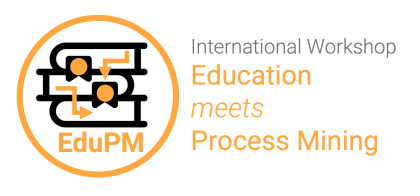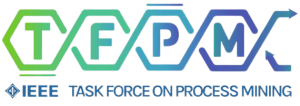
1st International Workshop
“Education meets Process Mining" (EduPM 2022)
–This workshop is organized within the International Conference on Process Mining (ICPM 2022) in Bozen-Bolzano (Italy) on October 24, 2022 —
PROGRAM EduPM 2022
9:00 – 10:45 SESSION 1 (chair: Gert Janssenswillen)
- Open: Welcome to EduPM 2022
- Paper 1: Seppe Van Daele and Gert Janssenswillen – “Identifying the steps in an explorative data analysis: a process-oriented approach”
- Paper 2: Richard Hobeck, Luise Pufahl and Ingo Weber – “Process Mining on Curriculum-based Study Data – A Case Study at a German University”
- Paper 3: Luciano Hidalgo and Jorge Munoz-Gama – “Domain-Driven Event Abstraction Framework for Learning Dynamics in MOOCs Sessions”
10:45 – 11:30 BREAK 1
11:30 – 12:45 SESSION 2 (chair: Francesca Zerbato)
- Panel: Mieke Jans, Boudewijn van Dongen, Marcos Sepúlveda, Wil van der Aalst – “Lessons Learned in Education for Process Mining”
12:45 – 14:30 LUNCH
14:30 – 15:45 SESSION 3 (chair: Jorge Munoz-Gama)
- Paper 4: Miriam Wagner, Hayyan Helal, Rene Roepke, Sven Judel, Jens Doveren, Sergej Goerzen, Pouya Soudmand, Gerhard Lakemeyer, Ulrik Schroeder and Wil van der Aalst – “A Combined Approach of Process Mining and Rule-based AI for Study Planning and Monitoring in Higher Education”
- Paper 5: Narjes Rohani, Kobi Gal, Michael Gallagher and Areti Manataki – “Discovering Students’ Learning Strategies in a Visual Programming MOOC through Process Mining Techniques”
- Paper 6: Saimir Bala, Kate Revoredo and Jan Mendling – “Process Mining for Analyzing Open Questions Computer-Aided Examinations”
15:45 – 16:30 BREAK 2
16:30 – 17:30 SESSION 4 (chair: Wil van der Aalst)
- Show & Tell: Eugenio Hernandez Gomez and Angela-Sophia Gebert – “Get Certified: Blended Learning for Process Mining powered by the Celonis Academic Alliance”
- Discussion: Position Paper, Collaborations, Projects …. ¿What’s next?
- Awards: Best Paper Award & Best Student Paper Award
- Close: See you in EduPM 2023!
Important Dates
- Show&Tell: August 10, 2022
- Regular (only the Abstract): August 10, 2022
- Regular (Full Paper): August 17, 2022
- Acceptance Notification: September 16, 2022
- Pre-Workshop Camera Ready: October 5, 2022
- Workshop Day: October 24, 2022
- Post-Workshop Camera Ready: November 7, 2022
The Workshop
Process Mining has proven to be a powerful interdisciplinary tool for addressing open challenges in several fields such as healthcare or finances … and Education is no exception. The recent Process Mining approaches proposed for learning analytics, curricular analytics, or MOOC analytics are just some examples. But the Education discipline is also contributing to Process Mining, providing best practices, lessons learned, and new artifacts for better teaching and assessing Process Mining.
The International Workshop on Education meets Process Mining (EduPM) aims at providing a high-quality forum for the intersection of Education and Process Mining. This intersection goes in both directions:
- Process Mining for Education (PM4Edu):
How could process mining be used to address some of the challenges in the field of education? E.g., Process Mining for learning analytics, curricular analytics, motivation trajectories, MOOCs and blended courses, self-regulated learning patterns, …
- Education for Process Mining (Edu4PM):
How could we improve the teaching of the Process Mining discipline? E.g., novel learning strategies tailored for Process Mining, new instruments to automatically assess specific topics of Process Mining, systematic studies of how Process Mining is being taught on different educational programs or levels, a novel curriculum around Process Mining, among others.
Workshop Topics
Submitted works should fall in one of the two categories: 1) Process Mining for Education or 2) Education for Process Mining. Education is a broad umbrella that includes all types of education: primary, secondary, professional, online, in-company, etc. The workshop aims at both more theoretical contributions such as new techniques and algorithms, and more applied contributions such as methodologies, systematic studies, and empirical contributions such as user and case studies.
The topics of interest for Process Mining for Education (PM4Edu) include, but are not limited to:
- Process Mining for Learning Analytics
- Process Mining for Curricular Analytics
- Analysis of MOOC/SPOC/blended with Process Mining
- Novel frameworks and taxonomies of PM4Edu
- Event log collection and processing in Educational environments
- Self-Regulation and Self-Efficacy assessment through Process Mining
- Gamification through Process Mining
- Predicting and simulating educational processes with Process Mining
- Ethics and privacy for educational data gathering and processing though Process Mining
- PM4Edu for motivation trajectories and behavioral patterns analysis
- WACI (Wild And Crazy Ideas) for PM4Edu
The topics of interest for Education for Process Mining (Edu4PM) include, but are not limited to:
- New active learning methodologies for Edu4PM
- Design and Implementation of new resources for Edu4PM
- Novel assessment instruments for Edu4PM
- Feedback approaches tailored for Edu4PM
- Teaching the Process of Process Mining and Procedural Thinking
- Systematic studies of Edu4PM in different education dimensions
- Best Practices and Lessons Learned for Edu4PM
- New resources and Smart Learning Environments for Edu4PM
- Process Mining instructor professionalization and certification
- Teaching PM for underrepresented groups, including students with disabilities
- Success Case Studies and Application of Edu4PM
- WACI (Wild And Crazy Ideas) for Edu4PM
Contributions Types
Two types of contributions are accepted: Regular Paper and Show&Tell:
- Regular Paper:
Submitted papers must be a research contribution, and will be evaluated on the basis of significance, originality, technical quality, and potential to generate relevant discussion. Submissions must use the Springer LNCS/LNBIP format. Submissions must be in English and must not exceed 12 pages (including figures, bibliography and appendices). Each paper should clarify the relation of the paper with the workshop main topics, clearly state the problem being addressed, the goal of the work, the results achieved, and the relation to other work. Submissions must be original contributions that have not been published previously, nor already submitted to other conferences or journals in parallel with this workshop. Accepted papers will be published by Springer as a post-workshop proceedings volume in the series Lecture Notes in Business Information Processing (LNBIP). At least one author of each accepted paper must register and participate in the workshop.
- Show&Tell:
These submissions are non-research contributions, where authors present an interesting element or initiative for the EduPM community. Some examples include personal experiences and lessons learned from previous EduPM projects, new academic EduPM curriculums, a new academic alliance of a Process Mining tool, new MOOCs or online training available, recommendations on how to structure a short/long Process Mining course, teasers for a specific EduPM technique or tool, a call for contributors of a large EduPM project or study, new books for teaching PM, etc. Show&Tell contributions will be presented to the whole EduPM community in an interactive and participation-encouraging format session within the workshop. The final format of the interactive session will be determined by the organizers, based on the number and nature of the accepted contributions. To be able to present a Show&Tell, authors must submit a document summarizing their contribution and clearly stating the impact and benefits for the EduPM community. The format is free but submissions must be in English and must not exceed 2 pages. Show&Tell contributions will not be included in the proceedings but they may be uploaded to the workshop web. At least one author of each accepted Show&Tell must register and participate in the workshop.
Submission
Both Show&Tell and Regular Papers must be submitted electronically as a self-contained PDF file via the Easychair submission system: https://easychair.org/conferences/?conf=icpm2022
In the case of Regular Papers, the abstract of the paper (without including the full paper) must be submitted in advance using the Easychair system. Later, authors can update the submission to upload the full paper pdf. Deadlines for both the abstract and full paper submissions are available at the Important Dates section.
Program
It is a full-day workshop. The program includes the presentation of the Regular Papers, but also an interactive open-format session to present the Show&Tell contributions and discuss future community efforts.
Registration
This workshop is part of the International Conference on Process Mining (ICPM 2022) All registration procedure and logistics information are managed directly by ICPM.
Organizing Committee

Jorge Muñoz Gama
Pontificia Universidad Catolica (Chile)
jorgemunozgama.com

Francesca Zerbato
University of St. Gallen (Switzerland)
Francesca’s Web

Gert Janssenswillen
Hasselt University (Belgium)
janssenswillen.com

Wil van der Aalst
RWTH Aachen University (Germany)
vdaalst.com

This workshop is an initiative of the IEEE Task Force on Process Mining
Program Committee
- Wil van der Aalst – RWTH Aachen University
- Mitchel Brunings – Eindhoven University of Technology
- Andrea Burattin – Technical University of Denmark
- Josep Carmona – Universitat Politècnica de Catalunya
- Jan Claes – Artevelde University of Applied Sciences
- Rebeca Cerezo – University of Oviedo
- Dragan Gasevic – Monash University
- Jerome Geyer-Klingeberg – Celonis
- Luciano Hidalgo – Pontificia Universidad Católica de Chile
- Gert Janssenswillen – Hasselt University
- Manuel Lama – University of Santiago de Compostela
- Sander Leemans – Queensland University of Technology
- Felix Mannhardt – Eindhoven University of Technology
- Jorge Maldonado-Mahauad – Universidad de Cuenca
- Niels Martin – Hasselt University
- Jorge Munoz-Gama – Pontificia Universidad Católica de Chile
- Peter Reimann – The University of Sydney
- Cristobal Romero – University of Cordova
- Mar Pérez-Sanagustín – Institut de Recherche en Informatique Toulouse (IRIT)
- Marcos Sepúlveda – Pontificia Universidad Católica de Chile
- Pnina Soffer – University of Haifa
- Ernest Teniente – Universitat Politècnica de Catalunya
- Jochen De Weerdt – KU Leuven
- Francesca Zerbato – University of St. Gallen
